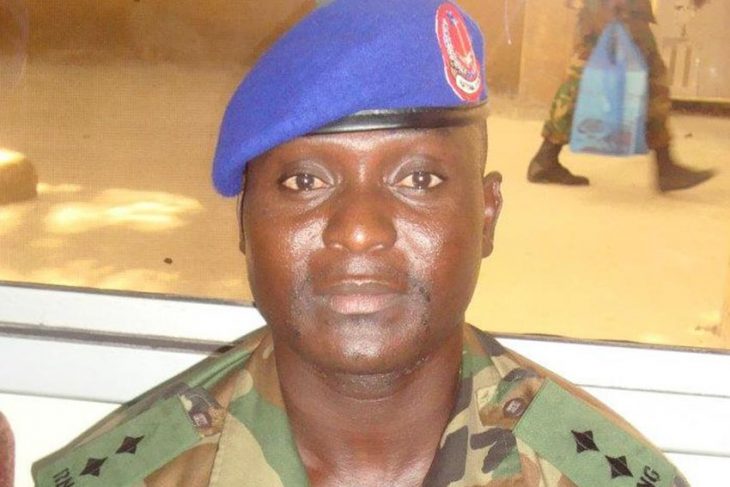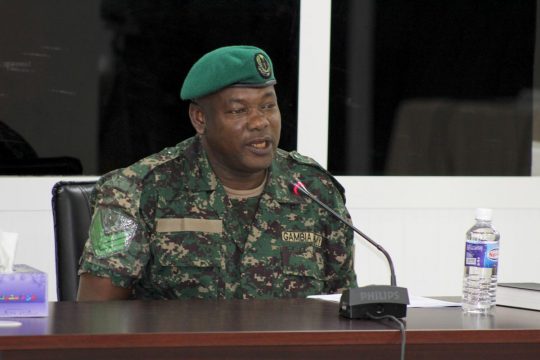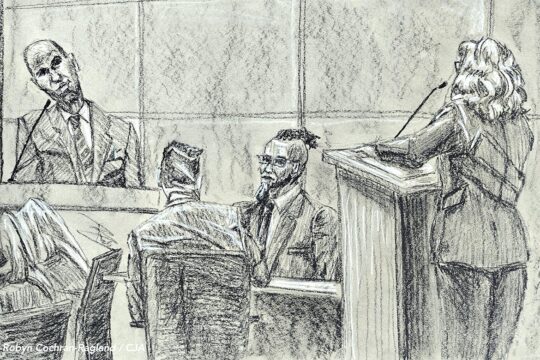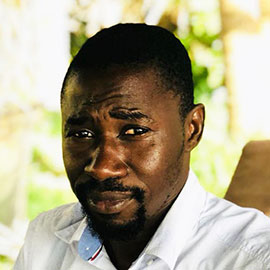In 2013, Alhaji M. Ceesay and Ebrima Jobe, two American citizens of Gambian descent, joined a long list of Gambia’s disappeared people. Seven years later, one the alleged persons implicated in their disappearance, Michael Sang Correa, was indicted last week before the US District Court of Colorado. In its indictment, the US Department of Justice alleges that the Gambian national is responsible for the torture of at least six people in 2006, following an attempted coup against the former president Yahya Jammeh.
Correa – who was residing in Denver, Colorado – has been detained in the US since September 2019 by US Immigration and Customs Enforcement for overstaying his visa. Behind this case, there's been a long history of complicated relationships between Gambia’s former dictator and the United States, especially in the last four years of Jammeh’s rule over the fate of the two American citizens, whose last known whereabouts was the West African country.
As part of its mandate, the Truth, Reconciliation and Reparations Commission (TRRC) established in January 2019, is to make known the whereabouts of the disappeared. In the case of Jobe and Ceesay, the Commission had thoroughly investigated how they were killed. And in July last year, the US got a first answer to what happened to their citizens when they heard a confession from a Jungler involved in their execution, who narrated how they were arrested as well as where they were taken and how they were executed.
“Jammeh ordered us to chop them into pieces”
Omar Jallow alias “Oya” was a member of Jammeh’s hit squad who participated in illegal execution of about 48 people, he told the truth commission in July 2019. According to Jallow, Jobe and Ceesay were picked up in Brusubi, about 40 minutes’ drive from Banjul. A team of Junglers mounted a checkpoint, being aware that the two Americans’ car took off from a hotel in Kololi, about 10 minutes’ drive from Brusubi. A member of the Junglers reportedly doing a reconnaissance on the two was Michael Correa, according to Jallow.
“They were at a hotel and Michael Correa was there observing their movements. If they came out, we would be called to go and arrest them. That was what happened,” said Jallow. “We were in constant communication with Michael Correa who was behind them, monitoring their movements. When their vehicle came, we stopped it. We asked them out. There were five people, including two girls and a driver.”
According to Jallow, they were suspected of plotting to overthrow former president Jammeh. Jobe and Ceesay would be interrogated, their house searched, and later executed. “Jammeh ordered us to chop them into pieces,” said Jallow.
First ever prosecution of a Jungler
“The United States welcomes the additional information that has come to light as this provides an opportunity to renew our investigation into the circumstances surrounding their deaths,” said the US embassy in a statement in July 2019, after the revelations before the TRRC. “We will pursue a close partnership with Gambian authorities based on these new revelations to continue to investigate the disappearance of these American citizens,” added the statement.
In 2006 Gambian authorities quashed a coup led by the then army chief Colonel Ndure Cham. Cham would later be executed by Junglers following his arrest a few years later. Dozens of people were arrested following the foiled coup, some of whom were tortured at the headquarters of the National Intelligence Agency. Correa faces one count of conspiracy to commit torture and six counts of inflicting torture on specific individuals.
The indictment of Correa is the first prosecution of a member of Jammeh’s death squad anywhere in the world. Among the six Junglers arrested in Gambia after the fall of Jammeh, four are free, and two are kept in detention without charges. The prosecution of Correa in the United States will be also the second biggest of Jammeh-era crime, after the arrest of Gambia’s former interior minister Ousman Sonko who is on pretrial detention in Switzerland. Sonko faces charges of crimes against humanity.
Involved in ‘Operation magic pen’
But before the TRRC, there were even more serious allegations against Corea.
In December 2004, Deyda Hydara, a prominent Gambian journalist who was a president of the country’s Press Union, was shot dead. Hydara was killed in a drive-by shooting as he drove home from work. According to Jungler Malick Jatta – who admitted before the TRRC, in July 2019, he was involved in the killing – three taxis took part in this operation dubbed “operation magic pen”, and Correa was in one of the taxis.
Correa’s group was led by another prominent Jungler, Malafi Corr. Corr would later be executed with Gambia’s former intelligence chief Daba Marenah and three others in 2006. The five were accused of involvement in a foiled coup that year. Correa was again named by Jungler Alieu Jeng to have participated in the operations that led to the execution of Marenah and his colleagues. Jeng testified before the Commission in August 2019. Two months before, when he appeared before the TRRC in June 2019, captain Buja Darboe, one of the soldiers implicated in the 2006 coup, accused Correa of involvement in their torture.
After Correa’s indictment, Baba Hydara, son of the murdered Gambian journalist, expressed his relief: “Hearing Correa’s indictment in US means so much for victims of former president Yahya Jammeh, not just his direct victims. This shows that no matter where they run to or hide, eventually justice will catch up with them,” said Hydara to Justice Info.
Justice for victims, loss for the truth commission?
Before Gambia’s Truth Commission, Correa is certainly a person of interest. “Mr. Correa has been adversely mentioned by several TRRC witnesses,” Dr Baba Galleh Jallow, its executive secretary, told Justice Info. “We would have loved for Correa to appear before the Commission, so we can get his own side of the story for whatever it is worth. He may have come and told the truth or not,” said Jallow. However, the TRRC had never made attempts to seek his extradition from the United States, he confirmed. “His failure to appear before the Commission does not necessarily leave a significant gap in our investigations because we have already heard from many witnesses, including his fellow Junglers, of his role in human rights violations,” added Jallow.
On June 12, Gambia’s Justice Ministry welcomed Correa’s charges. Abubarcarr Tambadou, the country’s justice minister, hailed the “strong support” Gambia receives from United States. “The indictment of Mr Correa by US authorities is an extraordinary legal milestone,” said Tambadou. “It demonstrates that no matter where such crimes are committed, and wherever the culprits may be hiding, global accountability mechanisms will reach them, and that there is no hiding place for those who commit such crimes in today’s world. The Government of The Gambia will continue to cooperate with US authorities.”








